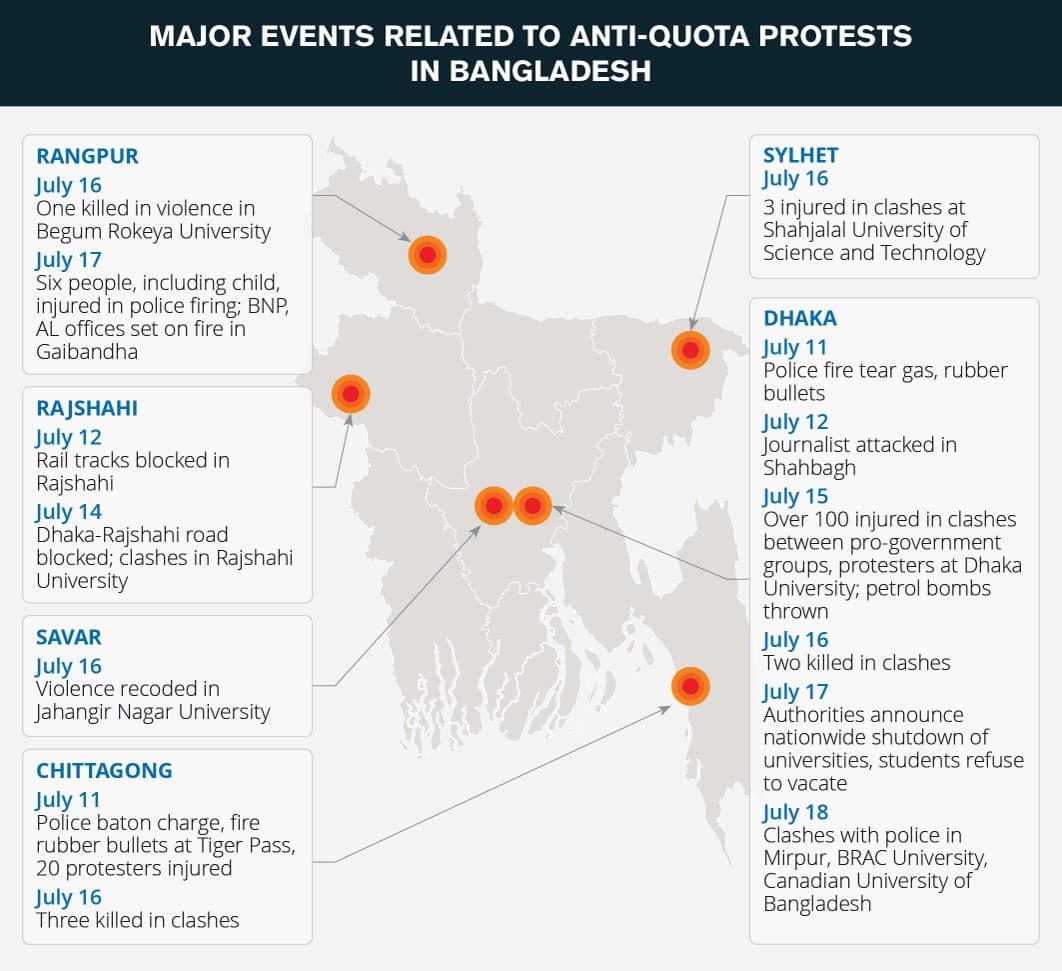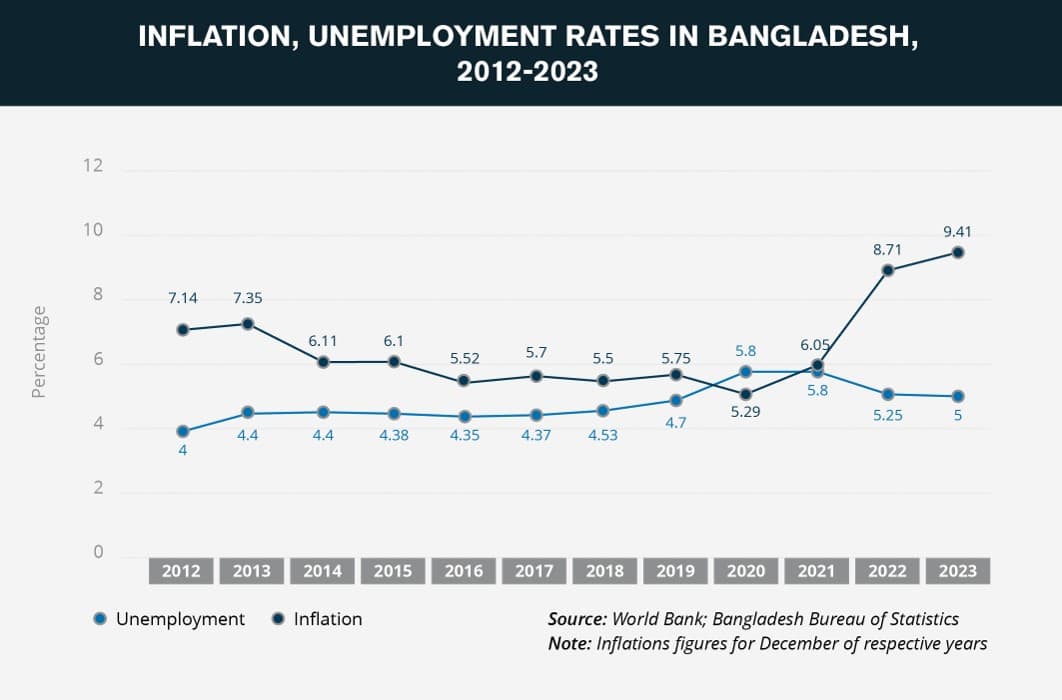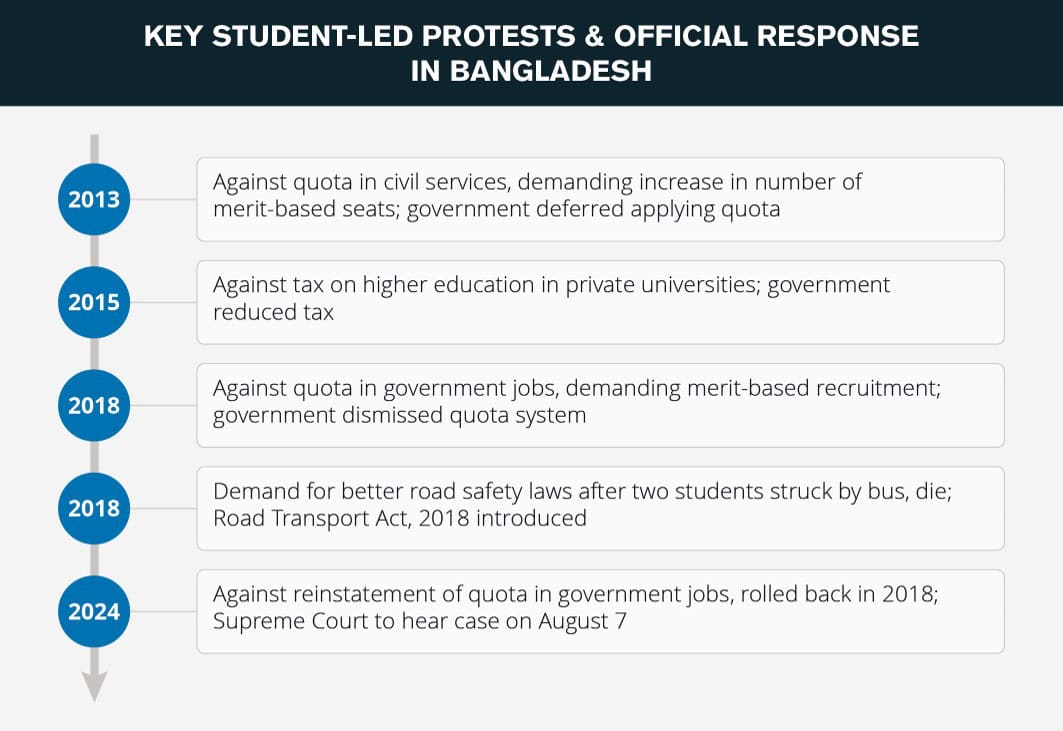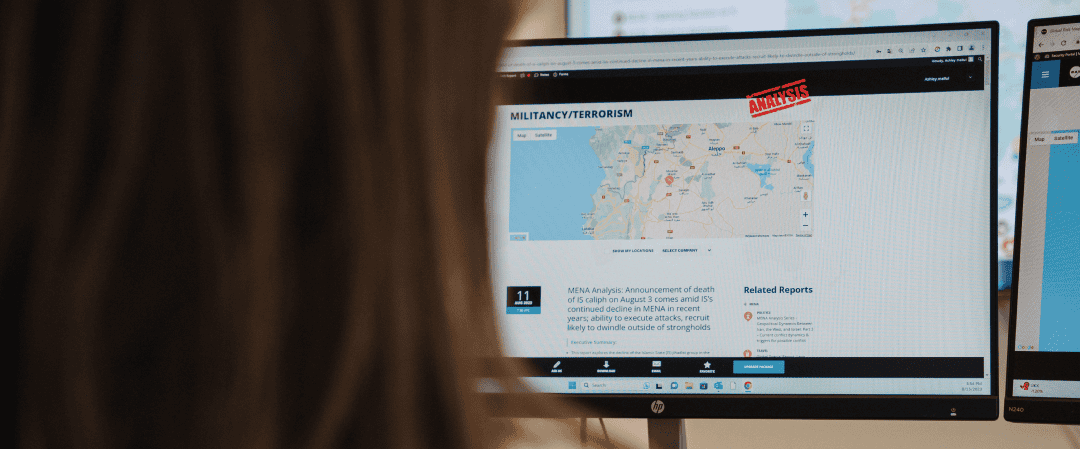
MAX Security: Bangladesh Analysis
- perry-admin
Table of Contents
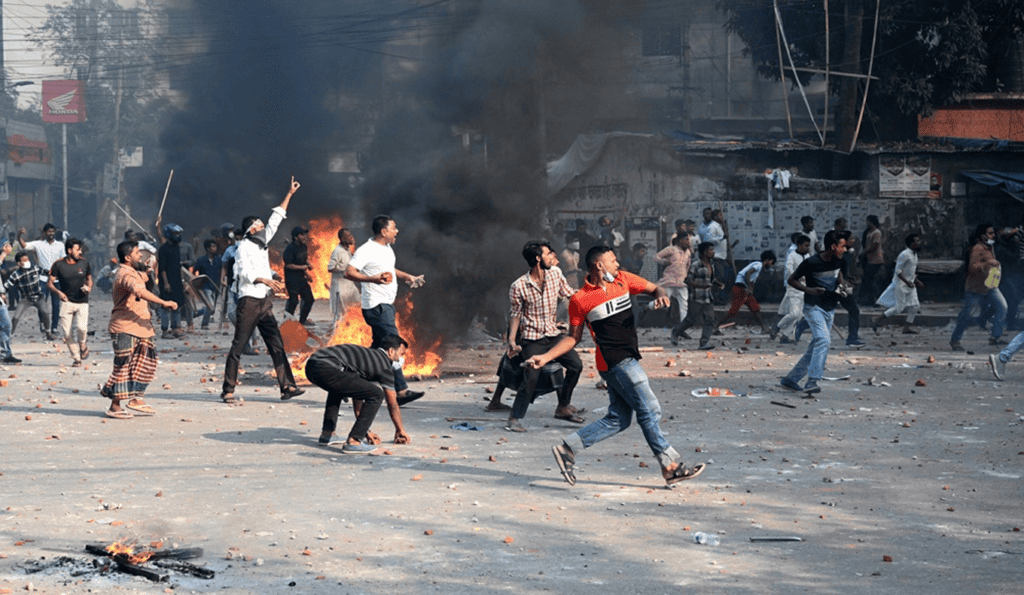
This report examines the recent protests in Bangladesh triggered by the reinstatement of a job quota for freedom fighters’ descendants. It explores the underlying socio-economic discontent, assesses the current unrest, and provides key recommendations for ensuring safety and business continuity. This analysis is essential for understanding and managing the risks associated with the ongoing instability.
Executive Summary
-
Since July 1, large protests have occurred across Bangladesh, centered in the capital Dhaka, against the Bangladesh High Court’s reinstatement of a quota that reserves jobs for the descendants of freedom fighters. This was previously rolled back by the government in 2018 after large-scale student protests.
-
At least six people have reportedly been killed in the violent protests nationwide following the verdict, with students enforcing shutdowns and blocking roads during their action.
-
The protests reflect a broader dissatisfaction with the government’s perceived passivity over the issue and its handling of the economy
-
The protests are liable to continue ahead of an expected Supreme Court ruling in the coming weeks. There is a high collateral risk to civilians due to the violent clashes between quota reform protesters and pro-government groups.
-
While the movement is expected to dissipate following outreach from the AL and a possible favorable verdict from the judiciary, simmering tensions are liable to persist. They will inform future anti-government campaigns over economic concerns in the coming months.
-
We advise against nonessential travel to Bangladesh, including Dhaka, at the present time due to the ongoing protests and unrest. Those operating or residing in Bangladesh are advised to minimize outdoor movement and allot for significant disruptions to business continuity and travel.
Current Situation
-
At least six people were killed and 400 injured, as of July 18, during nationwide protests over the quota system for government jobs. Clashes have been reported between quota reform protesters and pro-government student groups.
-
The protests broke out on July 1, after a June 5 verdict from the High Court that reinstated a 30 percent quota for the descendants of freedom fighters in government jobs. According to the new regulations, at least 56 percent of such jobs will be reserved for freedom fighters’ descendants as well as marginalized groups.
-
The protests have largely involved students from colleges and universities across the country. The authorities have closed down all schools, colleges, universities, and Islamic educational institutions, as of writing. Meanwhile, the Supreme Court has suspended the High Court ruling temporarily and will present its verdict in the coming weeks. The next hearing is slated for August 7.
-
On July 18, student groups staged a nationwide shutdown protest with support from opposition parties such as the Bangladesh Nationalist Party (BNP).
-
The US Embassy in Dhaka issued an advisory on the day to avoid student-led demonstrations. The embassy will also remain closed to the general public while mission personnel are advised to restrict their movements to the diplomatic enclave on the day. India’s High Commission in Dhaka issued an advisory for its nationals in Bangladesh to avoid nonessential travel and minimize movement outside their residences.
-
On July 15, student protesters demanded Prime Minister Sheikh Hasina retract her statement from a July 14 press conference, claiming that it equated the protesters with “Razakars” or collaborators with the Pakistani army during the creation of Bangladesh in 1971.
-
Similar protests against the freedom fighters’ quota were held in 2018. Shortly after, the Awami League (AL) government rolled back the quota system.
Assessments & Forecast
Protests speak to broader disaffection with AL government, concerns over economy
-
The violent protests are reflective of sustained student outrage over the court ruling reinstating the freedom fighters’ job quota. However, they also signal broader disaffection with the government, which is rooted in perceptions that PM Hasina’s administration has been passive over the issue. Despite canceling the quotas after the 2018 demonstrations, the AL’s alleged failure to push back more strongly against the High Court’s recent decision likely informs perceptions that the government has absolved itself from responsibility by declaring the matter sub-judice. Further, it has likely enhanced the view that the AL is seeking to appeal to nationalists among its support base through its response to quotas.
-
At a deeper level, the quota protests are also a manifestation of public concerns regarding unemployment and economic stagnation in the country. According to the Bangladesh Bureau of Statistics, unemployment has risen in the first quarter of 2024 by 3.51 percent. Supply-side disruptions due to global conflicts and slow post-pandemic recovery have likely contributed to the economic downturn and the consequent flagging employment rate. Against this backdrop, the decade-high inflation rate of 9.73 percent in 2023 has increased living costs and appears to have fomented discontent with the government. Thus, student concerns over employability have likely crystallized over the quota issue and hiring in the public sector.
-
On the ground, anti-government hostilities have likely been exacerbated by the imputation of longstanding socio-political conflicts in the current protest campaign. The quotas were initially instituted for the descendants of freedom fighters in Bangladesh’s 1971 Liberation War. However, protesters appear to have taken specific umbrage with PM Hasina publicly equating the anti-quota camp with “Razakars,” who were seen as the enemy during the war. This outrage is witnessed in the sloganeering among the protesters, which makes reference to PM Hasina’s statement. The narrativization of the protests as a conflict between those loyal to the country and perceived traitors has likely served as a plank for broader mobilization among students nationwide.
-
Finally, the alleged involvement of pro-government vigilante groups in clashes with protesters has likely led to a significant escalation of violence. This comes largely expected, given that the AL’s student and youth groups, such as the Bangladesh Chhatra League, Jubo League, and Swechchhasebak League, have typically intervened to counter anti-government campaigns. At a structural level, the high levels of politicization on campuses and rivalries among opposing-party student groups have likely enabled the breakout of violence.
Demonstrations to continue ahead of Supreme Court verdict, likely to dissipate over long term
-
FORECAST: In the immediate term, demonstrations are expected to continue across the country, particularly in light of the protester deaths. The campaign’s trajectory will closely correspond to the upcoming Supreme Court verdict on the quota issue, especially the next hearing on August 7. At present, there is a high risk of violence amid clashes, especially given that the pro-government camp has allegedly formed vigilante groups to quell protests. While initially exercising restraint due to the poor optics of a heavy-handed crackdown, local law enforcement is likely to be less tolerant of demonstrations due to the escalation of violence among rival groups. The shutdown of educational institutions is liable to authorize a more stringent police response to students who continue to gather, thus allowing security forces to use greater force in dispersals.
-
FORECAST: As with 2018, the AL government can be expected to initiate outreach to appease the protesters. This will likely take the form of a public relations campaign to signal that the current administration is not opposed to the students’ demand for quota reform. The party’s leadership is likely to rein in its student and youth groups, calling for greater restraint. As witnessed on July 16, the government is liable to file appeals with the Supreme Court against the High Court ruling or possibly announce committees to look into quota reform.
-
FORECAST: PM Hasina’s administration will also increasingly link the protests to opposition groups to build on its longstanding narrative that these parties are working against the country’s interests. This is especially likely given the BNP’s pledge of support to the quota reform protests. Thus, the government will increasingly implicate the main opposition BNP in the violence with claims that its leadership has initiated the movement to undermine the state. The BNP’s pledge of support for the protest campaign will be used by the government to legitimize a more heavy-handed crackdown on opposition groups in the coming weeks. Early signs of such a possibility were seen in the July 17 raid on the BNP’s central office in Naya Paltan, Dhaka.
-
FORECAST: In the longer term, the protests are liable to gradually dissipate. This is given the leaderless nature of the movement, the absence of strong mobilization networks that connect protesting groups nationwide, and a possible favorable verdict by the Supreme Court that pushes quota reform. However, the aforementioned structural issues, such as unemployment and the perceived intimidatory tactics of the AL’s student groups, are unlikely to be resolved for the foreseeable future. This will sustain simmering levels of disaffection with the administration, potentially manifesting in intermittent demonstrations over issues such as the high costs of living in the coming months.
-
FORECAST: At present, the implications for foreign businesses operating in the country are largely secondary, as a consequence of the violence. There is a high collateral civilian risk to those near protests due to the use of cold weapons and crude explosives during clashes. Further, the police’s use of tear gas and similar forcible dispersal measures against protesters compounds such threats. Given reports that student protesters are using social media for mobilization, internet and telecom networks are likely to be suspended by the authorities at limited to no notice to prevent gatherings. This will impact business continuity, particularly in Dhaka where the risks from such mobilization are the highest.
-
FORECAST: Further, the students’ use of road blockades as a protest tactic will significantly disrupt travel, both within major cities and across the country. Thus, supply chains will likely be adversely affected as a result. Meanwhile, a significant increase in security deployments is expected nationwide. This is especially likely in Dhaka, where protests will be pronounced given that it is the capital and seat of political power. An increase in check posts, vehicular and identity checks, and temporary restrictions to movement in affected areas is likely. Stringent screening measures are expected at local transportation terminals to prevent the movement of protesters or weapons, potentially causing longer wait times.
Conclusion
The protests over the reinstatement of quotas in civil service jobs for freedom fighters are reflective of underlying discontent with the ruling AL government over its perceived inaction to the court verdict. They also speak to the growing public concerns over rising inflation and unemployment amid a flagging economy. The involvement of AL-linked student groups and rhetoric invoking the conflicts of the 1971 Liberation War have likely exacerbated hostilities. The protests are liable to continue ahead of the Supreme Court verdict on the issue in the coming weeks, potentially dissipating through greater government outreach and a favorable ruling. However, such tensions will persist and inform anti-AL campaigns, particularly over economic issues by the youth, in the longer term.
Recommendations
-
We advise against nonessential travel to Bangladesh, including Dhaka, at the present time due to the ongoing protests and unrest.
-
Those operating in the country are advised to minimize outdoor movement and adhere to stringent security protocols given the high risk of unrest.
-
Avoid the vicinity of all protests, student gatherings, and university campuses due to the threat of clashes between rival groups and intervention from law enforcement.
-
Throughout the country, maintain heightened vigilance in the vicinity of party offices and security force installations due to the high inter-party tensions and an expected crackdown on opposition groups.
-
Allot for disruptions to travel and business continuity due to road blockades, expected increase in security checks, and internet cuts.
-
Avoid discussing the issue with unfamiliar individuals or posting on social media due to the current sensitivities and the potential for violent confrontation.
SCOUT
INTEL AI BY MAX SECURITY
Fill in your details to schedule a demo with our team.
